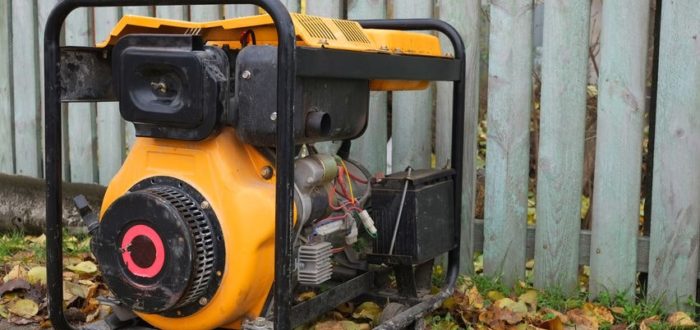Your portable generator. In times of emergency, it can be your life line. However, if used improperly, it can be a safety hazard.
A fatal safety hazard. According to a report from the U.S. Consumer Product Safety Commission, a total of 880 deaths were caused by portable generators between 2005 and 2017. Deaths which could have been prevented if proper safety precautions had been taken.
We’re not saying this to frighten you. On the contrary, a portable generator can be absolutely invaluable during blackouts, hurricanes and other emergencies. But if handled or maintained improperly, an electrical shock may turn out to be the least of your worries.
Learn the proper steps to ensure the safe use of your portable generator. And live by the proper safety rules for your portable generator.
Rule # 1 : Read And Review Your Owner’s Manual
At least once a year. Remember that portable generators will vary depending on voltage, life expectancy and power output. Warning labels exist for a reason. Always ensure your generator is only operated by people who have reviewed and understood those labels.
Rule # 2 : Avoid Leaving Your Generator Unattended
Sometimes this can and will be unavoidable. If necessary, secure your generator. Ensure that it’s on an even level of terrain where there isn’t any chance of rolling, slipping or tipping over at all times—even when you have your eyes on it. In addition, lock all wheels or fasten wedges underneath the tires to prevent your generator from accidentally rolling over if leaving it unattended.
Rule # 3 : Do Not Use Your Portable Generator Indoors
Even in attached structures. The threat of accidental fires, due to proximity to electrical outlets, is too great; especially in natural disasters. Make sure your generator is in a well ventilated area and at least 15 feet away from your home. Always ensure that the exhaust is pointed away from any windows or doors. Exhaust fumes from portable generators contain carbon monoxide—and just one can produce anywhere from 500 to 4,000 grams each hour, according to a recent study from the National Institute of Standards and Technology.
Rule # 4 : Avoid Exposure To Moisture
Never use your portable generator in rain, snow or wet conditions. Operate your generator on a dry surface under a tarp if need be to avoid malfunction, shock or electrocution. Water seeping in can cause short circuits in the breakers of your generator.
Rule # 5 : Pay Close Attention When Refueling Your Generator
Generators can grow precariously hot during operation. Allow it to cool down entirely before refueling. Gasoline could ignite your generator when hot. In addition:
- Keep fuel only in approved containers. Never fill them entirely. Air space allows gasoline to expand, avoiding spillage or bursting
- Store all fuel containers away from high traffic areas and in a secure and well ventilated place
- Always have a fire extinguisher on hand and ready to use—no matter what the situation
Rule # 6 : Don’t Exceed Your Generator’s Power Rating
Overloading outlets can present anelectrical hazard. Never try to operate your portable generator by plugging it into a wall outlet. Not only will this short circuit your home, but can send uncontrollable currents of electricity through the cord. Overloading a generator is one of the most typical causes of deadly fires.
Rule # 7 : Always Check Your Cord
Make sure that it’s unfrayed,free of any tears,isn’t missing any prongs and contains a grounding pin. Ensure your extension cord always has a power rating that can handle the wattage generated. Always keep them grounded and covered with cable covers when possible.
Rule # 8 : Keep Your Portable Generator And Surrounding Areas Clean
Remove any nearby debris when operating your generator, as accidental ignition is always a threat. Never operate your generator near greasy, wet or slick areas where tipping over could present a problem. Avoid using it near standing water, as exposure to electricity could cause severe electric shock.
Rule # 9 : Make Sure Your Generator Is Grounded
A portable ground fault circuit interrupter can be an incredibly valuable tool to have on hand in case of accidental electrocution. Occasionally, even a portable generator connected and grounded properly can become overloaded, resulting in malfunction and overheating. When in doubt, always review your owner’s manual.
Rule # 10 : Always Take Your Generator In For Regular Maintenance And Service
You may be tempted to maintain your portable generator yourself; and while it’s not the easiest task in the world, it’s also not entirely impossible. If you choose to do so, make certain you’ve let your generator cool off completely and try to keep a clear head. Electrical components in particular can be dangerous if your not a certified professional.
At Greg’s Small Engine Service and Repair, we service the portable generator needs of Northern Nevada professionally, promptly and more importantly—7 days a week. We carry a wide variety of replacement parts and specialize in both full scale service and preventative maintenance for Reno, Carson City, Lake Tahoe and beyond. We’ll even arrange to pick up and deliver your generator after servicing. Give us a call at (775) 790-0435—don’t wait until it’s too late!






















